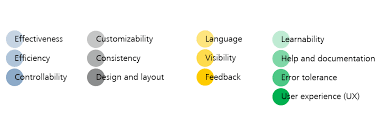Crafting User-Friendly Experiences: The Role of a Frontend Software Engineer
Frontend Software Engineer: Crafting User-Friendly Experiences
Frontend software engineers play a crucial role in the development of websites and applications. They are responsible for creating the user interface and ensuring that the end product is not only visually appealing but also functional and user-friendly.
These professionals are skilled in languages such as HTML, CSS, and JavaScript, which are essential for building interactive and responsive web pages. They work closely with designers and backend developers to bring a project to life, translating mockups and wireframes into code that users can interact with.
Frontend software engineers need to have a keen eye for design, as well as a solid understanding of user experience principles. They strive to create interfaces that are intuitive and easy to navigate, enhancing the overall user experience.
Continuous learning is key in this field, as technologies and trends evolve rapidly. Frontend software engineers stay up-to-date with the latest tools and frameworks to ensure they are using the most efficient solutions for their projects.
In addition to technical skills, effective communication is essential for frontend software engineers. They often collaborate with various team members, including designers, project managers, and backend developers, to ensure that the final product meets both technical requirements and user expectations.
Overall, frontend software engineers play a vital role in shaping how users interact with websites and applications. Their expertise in creating engaging and accessible interfaces helps businesses connect with their audience effectively in today’s digital world.
5 Key Advantages of Being a Frontend Software Engineer: Enhancing User Experience and Collaboration
- Frontend software engineers create visually appealing user interfaces.
- They ensure websites and applications are user-friendly and easy to navigate.
- Frontend software engineers collaborate with designers and backend developers to bring projects to life.
- Continuous learning is essential in this field, keeping frontend software engineers up-to-date with the latest technologies and trends.
- Their expertise in design and user experience principles helps enhance overall user satisfaction.
Challenges of Being a Frontend Software Engineer: Navigating Competition, Constant Learning, and Balancing Design with Functionality
- Highly competitive field with a large number of professionals vying for job opportunities.
- Continuous need to stay updated with rapidly evolving technologies and frameworks.
- May face challenges in balancing design aesthetics with technical functionality requirements.
Frontend software engineers create visually appealing user interfaces.
Frontend software engineers excel in creating visually appealing user interfaces that captivate and engage users. By leveraging their design skills and expertise in languages like HTML, CSS, and JavaScript, they craft interfaces that are not only aesthetically pleasing but also intuitive to navigate. Their keen attention to detail and understanding of user experience principles enable them to create interfaces that leave a lasting impression on users, enhancing the overall usability and enjoyment of websites and applications.
They ensure websites and applications are user-friendly and easy to navigate.
Frontend software engineers excel in ensuring that websites and applications are user-friendly and easy to navigate. By leveraging their expertise in design principles and interactive technologies, they craft interfaces that enhance the overall user experience. Their attention to detail and focus on usability result in intuitive layouts, seamless navigation, and engaging interactions, ultimately making digital platforms more accessible and enjoyable for users.
Frontend software engineers collaborate with designers and backend developers to bring projects to life.
Frontend software engineers play a pivotal role in project development by collaborating closely with designers and backend developers to bring projects to life. By working together, they ensure that the user interface not only meets design specifications but also functions seamlessly with the backend systems. This collaboration results in cohesive and user-friendly applications that deliver a seamless experience for end users.
Continuous learning is essential in this field, keeping frontend software engineers up-to-date with the latest technologies and trends.
Continuous learning is a fundamental aspect of being a frontend software engineer, as it ensures that professionals in this field remain current with the ever-evolving landscape of technologies and trends. By staying informed about the latest advancements, frontend software engineers can leverage new tools and frameworks to enhance their skills and deliver cutting-edge solutions to create engaging and user-friendly interfaces for websites and applications. This commitment to ongoing education allows frontend software engineers to adapt to industry changes swiftly and effectively, ultimately contributing to the success of their projects and ensuring they meet the demands of modern digital experiences.
Their expertise in design and user experience principles helps enhance overall user satisfaction.
Frontend software engineers bring a valuable skill set to the table, as their expertise in design and user experience principles plays a significant role in enhancing overall user satisfaction. By creating visually appealing interfaces and ensuring intuitive navigation, frontend software engineers improve the usability of websites and applications, ultimately leading to a more positive user experience. Their attention to detail and focus on user-centric design contribute to increased engagement and customer satisfaction, making them indispensable members of any development team.
Highly competitive field with a large number of professionals vying for job opportunities.
In the realm of frontend software engineering, one significant challenge is the highly competitive nature of the field, where a vast number of professionals compete for job opportunities. With the increasing demand for skilled frontend developers, the job market can be fiercely competitive, making it challenging for individuals to stand out among their peers and secure desired positions. This intense competition underscores the importance of continuous skill development and staying abreast of emerging technologies to remain competitive in this dynamic industry.
Continuous need to stay updated with rapidly evolving technologies and frameworks.
One significant challenge for frontend software engineers is the constant demand to stay abreast of rapidly evolving technologies and frameworks. With the tech industry constantly introducing new tools and updates, keeping up-to-date can be a daunting task. This continuous learning requirement adds pressure to professionals in this field, as they must invest time and effort to master new skills and adapt to changing trends to remain competitive and deliver cutting-edge solutions.
May face challenges in balancing design aesthetics with technical functionality requirements.
Frontend software engineers may encounter challenges in balancing design aesthetics with technical functionality requirements. While striving to create visually appealing interfaces that enhance user experience, they must also ensure that the design aligns with the technical specifications and performance goals of the project. This delicate balance requires careful consideration and collaboration with designers and backend developers to find solutions that meet both the aesthetic and functional needs of the software or website being developed. Failure to strike this balance can result in a disconnect between the visual design and technical implementation, ultimately impacting the overall usability and success of the final product.









